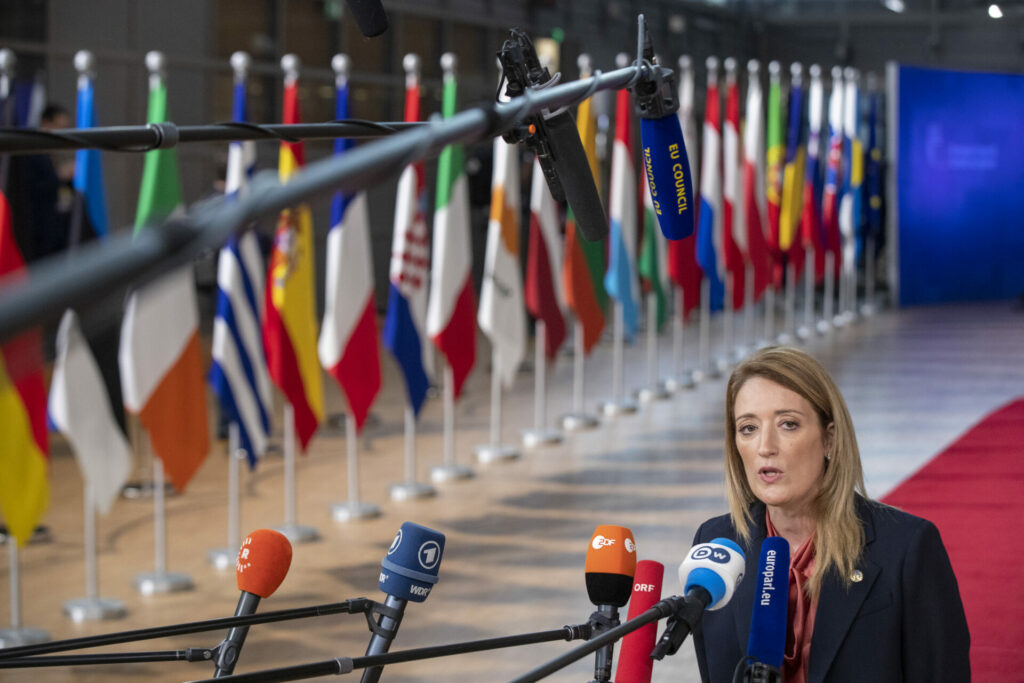Following Tuesday’s debate, the European Parliament adopted a resolution in response to the corruption allegations against Qatar and Morocco on the basis of the broader need for greater transparency in the EU institutions – with 541 votes in favour, two against, and three abstentions.
MEPs are "appalled" by the recent allegations that MEPs, former MEPs and EP staff are involved in corruption, money laundering and participation in a criminal organisation, a press release reads. They support the full cooperation of the House with the ongoing investigation, noting that "internal systems failed to prevent corruption."
"We have already done a lot, but we also still have a lot to do," European Parliament President Roberta Metsola told VRT before the start of the European summit in Brussels on Thursday. "There are too many ways of making decisions in the European Parliament."
There are "too many informal groups" that may be more vulnerable to outside influence, and "too many organisations where there is too little transparency about their funds," she pointed out. "The European Parliament wants to put an end to all these cases. I cannot say that this will never happen again, but I will do everything I can to ensure that the Parliament is not for sale."
Earlier this week, Belgian federal investigators discovered €150,000 in cash during a search of Greek MEP Eva Kaili and her partner Francesco Giorgi's Brussels apartment. A further €600,000 was found in a suitcase carried by Kaili's father as he was leaving the Sofitel hotel in downtown Brussels.
Investigators also found around €600,000 in cash in the home of former Italian MEP Pier Antonio Panzeri (another key individual implicated in the scandal) and raided the home of Belgian MEP Marc Tarabella, who is also involved, earlier this week.
On Thursday, MEPs also denounced the alleged corruption attempts by Qatar, which would constitute serious foreign interference in European democracy by paying large sums of money or offering large gifts to people with important positions in the EP.
As an immediate measure, MEPs have decided to suspend all work on legislative files relating to Qatar – particularly concerning visa liberalisation, the EU aviation agreement with Qatar, as well as planned visits, until the investigation shines light on the extent of the problem. They also ask that security passes for representatives of Qatari interests be suspended until the judicial investigations provide clarity.
Reforming Parliament’s rules
Additionally, the House is concerned about potential conflicts of interest caused by "side jobs," especially where some MEPs serve as managers, on the board of directors or on advisory boards of (or as consultants to) banks, multinational companies or publicly traded companies.
MEPs are now supporting a system of asset declarations at the beginning and end of each mandate. These declarations could be accessible only to relevant authorities and would be checked if there are substantiated allegations.
They are also committed to ensuring full transparency regarding their additional income, and to prohibit any external financing of MEP and political groups’ staff. Parliament will seek to establish an EU-level ban on donations from third countries to MEPs and political parties and asks the Commission to prepare a proposal to this end.
A "cooling-off period" should be introduced for the end of an MEP’s mandate, to tackle the "revolving doors" phenomenon, MEPs added.
Related News
- Qatar corruption scandal: Partner of suspected MEP Kaili confesses to receiving bribes
- 'Qatargate' corruption case discovered during investigation by Belgium's intelligence services
- Qatar corruption scandal: Morocco also implicated in alleged payment to Panzeri
The EU Transparency Register will be mandatory and have its scope extended to representatives of third countries and former MEPs, so as to strengthen it to verify information more thoroughly.
To help address other related issues, they also seek to set up an inquiry committee following the outcome of investigations and trials, to look into cases of corruption and improper actions by third countries, and a special committee to find flaws in Parliament’s framework and make proposals for reforms. An EP Vice-President should be tasked with verifying integrity, and fighting corruption and foreign interference.
Recognising that parliamentary friendship groups must be properly regulated and monitored if they are to continue to exist, MEPs instruct the Quaestors (those elected to oversee administrative and financial matters directly affecting MEPs) to implement existing rules and put together an accessible, up-to-date register. They are also calling for information on "legislative footprints" to be disclosed for proposed texts and amendments.
Working with other EU institutions and agencies
Parliament has also urged the Commission to finally come forward with a proposal to set up the Independent Ethics Body that Parliament proposed in September 2021, and recommends improvements to the EU staff regulation in order to align it with the Whistleblowers Directive, which it will implement internally.
It also emphasises the role of the European Public Prosecutor’s Office, Eurojust, Europol and the EU’s anti-fraud agency OLAF, and calls for the capacities and cooperation of EPPO and OLAF to be bolstered further, as well as for common anti-corruption rules for members and staff of EU bodies.

